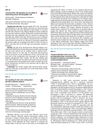 47 citations,
April 2003 in “Journal of dermatological science”
47 citations,
April 2003 in “Journal of dermatological science” Thujae occidentalis semen extract may help treat male pattern baldness by blocking a hair loss-related enzyme and reducing hair loss in mice.
39 citations,
January 1991 in “Oncology” High-dose vitamin A was safe and well-tolerated in a lung cancer treatment study.
 25 citations,
July 2016 in “The journal of investigative dermatology/Journal of investigative dermatology”
25 citations,
July 2016 in “The journal of investigative dermatology/Journal of investigative dermatology” Imiquimod cream activates hair follicle stem cells and causes early hair growth by changing immune cells and certain protein expressions.
22 citations,
June 1998 in “PubMed” Panax ginseng helps prevent hair follicle cell death and speeds up hair cell recovery after radiation in mice.
 21 citations,
April 2012 in “European Journal of Pharmaceutics and Biopharmaceutics”
21 citations,
April 2012 in “European Journal of Pharmaceutics and Biopharmaceutics” The gel with special fat-loaded particles from rice bran could be an effective skin treatment for hair loss.
 20 citations,
May 1985 in “British journal of nutrition”
20 citations,
May 1985 in “British journal of nutrition” Dietary essential fatty acids improved skin and hair conditions and partially corrected fat composition in diabetic mice.
 14 citations,
November 2005 in “Life sciences”
14 citations,
November 2005 in “Life sciences” Vitamin D3 may protect rat hair follicles from radiation damage.
 9 citations,
December 2013 in “Toxicological Research”
9 citations,
December 2013 in “Toxicological Research” Chamaecyparis obtusa oil may help hair grow similarly to minoxidil by affecting certain growth markers and cell factors.
5 citations,
August 2018 in “Thai Journal of Pharmaceutical Sciences (TJPS)” Riceberry by-products may promote hair growth and skin pigmentation, useful for cosmetics.

research Acne
4 citations,
January 2019 Acne is a common skin condition that can be influenced by diet, lifestyle, and hormones, and requires a treatment approach that includes psychological considerations.
 4 citations,
February 2016 in “Clinical Pharmacology & Therapeutics”
4 citations,
February 2016 in “Clinical Pharmacology & Therapeutics” Hair follicle samples effectively show how well the drug MK-0752 targets and engages with the Notch pathway.
 3 citations,
June 2020 in “Developmental Cell”
3 citations,
June 2020 in “Developmental Cell” Feather patterns are influenced by enhancers and chromatin looping, and the structure of protein complexes important for hair growth has been detailed.
 2 citations,
June 2020 in “AIDS”
2 citations,
June 2020 in “AIDS” Recreational drug use can cause misdiagnosed conditions and drug interactions in HIV patients.
2 citations,
September 2017 in “Journal of Investigative Dermatology” Notch1 signaling is impaired in hidradenitis suppurativa, affecting skin and hair cells.
 1 citations,
September 2016 in “Journal of Dermatological Science”
1 citations,
September 2016 in “Journal of Dermatological Science” FGF18 treatment during hair's resting phase can protect against hair loss from radiation.
 May 2023 in “Research Square (Research Square)”
May 2023 in “Research Square (Research Square)” Patients with acne and insulin resistance have different blood metabolites compared to those with only acne, which could help in diagnosis and treatment.
 April 2023 in “Journal of Investigative Dermatology”
April 2023 in “Journal of Investigative Dermatology” A new pain-measuring system using sensors and AI can effectively detect pain in mice, which may help assess pain in humans and develop treatments.
December 2020 in “Faculty Opinions – Post-Publication Peer Review of the Biomedical Literature” Hidradenitis suppurativa may be a type of autoinflammatory skin disease linked to gene mutations and immune system issues.
 December 2012 in “Bulletin of Egyptian Society for Physiological Sciences”
December 2012 in “Bulletin of Egyptian Society for Physiological Sciences” Copper (II) albumin complex improves healing of severe burns by its antioxidant, anti-inflammatory, and pain relief properties.

Hair follicles can be used to quickly assess drug effects in cancer treatment.
 January 1982 in “Journal of The American Academy of Dermatology”
January 1982 in “Journal of The American Academy of Dermatology” Experts discussed treatments for skin conditions in children, emphasizing hydration, cautious medication use, and early intervention for infections.
 154 citations,
November 2017 in “Development”
154 citations,
November 2017 in “Development” Fibroblast Growth Factors (FGFs) are important for tissue repair and regeneration, influencing cell behavior and other factors involved in healing, and are crucial in processes like wound healing, bone repair, and hair growth.
 107 citations,
December 2003 in “Dermatologic Therapy”
107 citations,
December 2003 in “Dermatologic Therapy” Interferon, especially alfa interferon, is an effective treatment for cutaneous T-cell lymphoma with manageable side effects.
 53 citations,
June 2012 in “Annales d'Endocrinologie”
53 citations,
June 2012 in “Annales d'Endocrinologie” The document concludes that recognizing and properly diagnosing lipodystrophy syndromes is crucial for effective management and treatment.
51 citations,
October 2000 in “Acta dermato-venereologica” PPAR alpha may help in hair growth and could be a target for treatment.
 40 citations,
August 2022 in “Frontiers in immunology”
40 citations,
August 2022 in “Frontiers in immunology” Blocking JAK/STAT pathways can help treat hair loss from alopecia areata.
 16 citations,
July 2020 in “International Journal of Molecular Sciences”
16 citations,
July 2020 in “International Journal of Molecular Sciences” Ruxolitinib may help treat hair loss by reducing inflammation, promoting hair growth signals, and protecting hair follicle immunity.
 16 citations,
October 2018 in “Experimental Dermatology”
16 citations,
October 2018 in “Experimental Dermatology” Mesenchymal stem cell therapy may help treat alopecia areata by promoting hair growth and reducing inflammation.
14 citations,
April 2021 in “International journal of molecular sciences” Mesenchymal stem cells may help treat hair loss by improving hair cell growth and reducing inflammation.
 13 citations,
April 2022 in “Anais brasileiros de dermatologia/Anais Brasileiros de Dermatologia”
13 citations,
April 2022 in “Anais brasileiros de dermatologia/Anais Brasileiros de Dermatologia” The document concludes that more research is needed to find effective treatments for Lichen planopilaris and Frontal fibrosing alopecia.






















